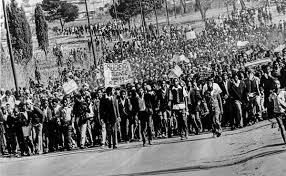This Day in History: February 24, 1976
Additional Date: February 24, 1976
The roots of the student uprising of 1976 can be traced in part to the cutbacks by the Apartheid government on education for Black students. The result was that Black teachers now had more students to teach and fewer resources to accomplish this task. This coupled with the Apartheid State's insistence on making an inferior curriculum mandatory and stipulating that all instruction had to be conducted in Afrikaans created the conditions that would later erupt as the 1976 student uprising.
Initial reactions to the Apartheid education policy was one of displeasure and rejectment. Students as well as teachers registered their displeasure as early as the 24 of February 1976. However, these rumblings were largely ignored by the Apartheid regime as the Government was more focussed on threats from freedom fighters that belonging to the banned liberation movements.
This oversight would cost the Apartheid government dearly as the protests by students in 1976 helped radicalise and made an entire generation of South African students aware of the political situation. This in turn, signalled the beginning of the end for Apartheid South Africa.
